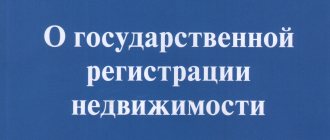ATTENTION : it is necessary to remember that it is difficult to succeed in business alone without legal experience and the necessary skills. In this regard, you can sign up for a consultation with our lawyers on housing issues of housing privatization through the court of the Law Office “Katsailidi and Partners”, who will assess the prospects of your case and accompany you on the path to the desired result.
Recognition of ownership of real estate
1. GENERAL PROVISIONS
1.1. This Privacy Policy regarding the processing of personal data of users of the site https://www.dvitex.ru/ (hereinafter referred to as the Privacy Policy) was developed and applied by Legal LLC, OGRN 1107746800490, Moscow, per. Golutvinsky 1st, building 3-5, office 4-1 (hereinafter referred to as the Operator) in accordance with paragraphs. 2 hours 1 tbsp. 18.1 of the Federal Law of July 27, 2006 No. 152-FZ “On Personal Data” (hereinafter referred to as the Law on Personal Data).
1.2. This Privacy Policy defines the Operator’s policy regarding the processing of personal data accepted for processing, the procedure and conditions for the processing of personal data of individuals who have transferred their personal data for processing to the Operator (hereinafter referred to as personal data subjects) with and without the use of automation tools, establishes procedures aimed at preventing violations of the legislation of the Russian Federation, eliminating the consequences of such violations related to the processing of personal data.
1.3. The privacy policy was developed to ensure the protection of the rights and freedoms of personal data subjects when processing their personal data, as well as to establish the responsibility of the Operator's officials who have access to the personal data of personal data subjects for failure to comply with the requirements and standards governing the processing of personal data.
1.4. Personal data of the Personal Data Subject is any information relating to a directly or indirectly identified or identifiable individual.
1.5. The Operator processes the following personal data of Users:
- Full Name;
- E-mail address;
- Phone number;
- other data necessary for the Operator when providing services to Users to ensure the functioning of the Site.
1.6. The Operator processes personal data of Personal Data Subjects for the following purposes:
- providing the opportunity for feedback from Operator Specialists on User requests;
- providing the possibility of online payment for services ordered on the Site;
- ensuring the fulfillment of the Operator’s obligations to Users;
- for market research purposes;
- informing the Personal Data Subject about promotions, competitions, special offers, new services, discounts, advertising materials and other services, as well as receiving commercial or advertising information and free products, participating in exhibitions or events, performing marketing research and notification of all special initiatives for clients;
- statistical purposes;
- for other purposes, if the corresponding actions of the Operator do not contradict the current legislation, the activities of the Operator, and the consent of the Personal Data Subject has been obtained for the said processing.
1.7. The operator processes personal data of personal data subjects by performing any action (operation) or set of actions (operations) performed using automation tools or without the use of such means, including the following:
- collection;
- record;
- systematization;
- accumulation;
- storage;
- clarification (update, change);
- extraction;
- usage;
- transmission (distribution, provision, access);
- depersonalization;
- blocking;
- deletion;
- destruction.
2. PRINCIPLES FOR PROCESSING PERSONAL DATA
2.1. When processing personal data, the Operator is guided by the following principles:
- legality and justice;
- confidentiality;
- timeliness and reliability of obtaining the consent of the subject of personal data for the processing of personal data;
- processing only personal data that meets the purposes of their processing;
- compliance of the content and volume of processed personal data with the stated purposes of processing. The personal data processed should not be redundant in relation to the stated purposes of their processing;
- the inadmissibility of combining databases containing personal data, the processing of which is carried out for purposes incompatible with each other;
- storing personal data in a form that allows identifying the subject of personal data for no longer than required for the purposes of processing personal data;
- destruction or depersonalization of personal data to achieve the goals, their processing or in case of loss of the need to achieve these goals.
2.2. The processing of personal data by the Operator is carried out in compliance with the principles and rules provided for:
- Federal Law of July 27, 2006 No. 152-FZ “On Personal Data”;
- This Privacy Policy;
- Universal Declaration of Human Rights 1948;
- International Covenant on Civil and Political Rights 1966;
- European Convention for the Protection of Human Rights and Fundamental Freedoms, 1950;
- The provisions of the Convention of the Commonwealth of Independent States on Human Rights and Fundamental Freedoms (Minsk, 1995), ratified by the Russian Federation on August 11, 1998;
- The provisions of the Okinawa Charter for the Global Information Society, adopted on July 22, 2000;
- Decree of the Government of the Russian Federation dated November 1, 2012 No. 1119 “On approval of requirements for the protection of personal data during their processing in personal data information systems”;
- Order of the FSTEC of Russia dated February 18, 2013 No. 21 “On approval of the composition and content of organizational and technical measures to ensure the security of personal data when processed in personal data information systems”;
- Other regulatory and non-regulatory legal acts governing the processing of personal data.
3. OBTAINING PERSONAL DATA.
3.1. Personal data of personal data subjects is obtained by the Operator:
- by providing the subject with personal data when registering on the Site, when submitting applications, applications, questionnaires, forms, filling out registration forms on the Operator’s website or sending by e-mail, messages by telephone to the Operator’s support service;
- by other means that do not contradict the legislation of the Russian Federation and the requirements of international legislation on the protection of personal data.
3.2. The Operator receives and begins processing the Subject’s personal data from the moment of receiving his consent.
3.3. Consent to the processing of personal data is given by the subject of personal data from the moment of starting to use the site, including by indicating about, through the performance of implied actions by the subject of personal data.
3.4. The subject of personal data may at any time withdraw his consent to the processing of personal data. To revoke consent to the processing of personal data, you must submit a corresponding application to the Operator via available means of communication. At the same time, the Operator must stop processing them or ensure the termination of such processing and, if the preservation of personal data is no longer required for the purposes of their processing, destroy personal data or ensure their destruction within a period not exceeding 30 (Thirty) days from the date of receipt of the specified review .
3.5. If the Personal Data Subject withdraws consent to the processing of personal data, the Operator has the right to continue processing personal data without the consent of the Personal Data Subject only if there are grounds specified in the Personal Data Law.
3.6. The subject of personal data has the right to choose what personal data will be provided to him. However, in case of incomplete provision of the necessary data, the Operator does not guarantee the subject’s ability to use all services and products of the Site, to use all services of the Site.
3.7. The personal data subject can view, update or delete any personal data included in his profile at any time. To do this, he can edit his profile online in his personal account or send an email to
4. PROCESSING PROCEDURE FOR PERSONAL DATA
4.1. The operator takes technical, organizational and legal measures to ensure the protection of personal data from unauthorized or accidental access, destruction, modification, blocking, copying, distribution, as well as from other unlawful actions.
4.2. When processing personal data, the Operator applies legal, organizational and technical measures to ensure the security of personal data in accordance with Art. 19 of the Federal Law “On Personal Data”, Decree of the Government of the Russian Federation dated November 1, 2012 No. 1119 “On approval of requirements for the protection of personal data during their processing in personal data information systems”, Methodology for determining current threats to the security of personal data during their processing in personal information systems data approved by the FSTEC of the Russian Federation on February 14, 2008, Methodological recommendations for ensuring the security of personal data using crypto-means when processing them in personal data information systems using automation tools approved by the FSB of the Russian Federation on February 21, 2008 No. 149/54-144.
4.3. To authorize access to the Site, a Login and Password are used. The subject of personal data is responsible for the safety of this information. The subject of personal data does not have the right to transfer his own Login and Password to third parties, and is also obliged to take measures to ensure their confidentiality.
4.4. When transferring personal data, the Operator complies with the following requirements:
- does not disclose the personal data of the subject of personal data to a third party without expressed consent, except in cases where this is necessary for the purposes of processing personal data, preventing a threat to the life and health of the subject of personal data, as well as in cases established by law;
- does not disclose personal data for commercial purposes without the expressed consent of the subject of personal data;
- informs persons receiving personal data that this data can only be used for the purposes for which it was communicated, and requires these persons to take appropriate measures to protect personal data. Persons receiving the User’s personal data are required to maintain confidentiality;
- allows access to personal data only to authorized persons, and these persons must have the right to receive only those personal data that are necessary to perform specific functions.
4.5. The Operator has the right to disclose any information collected about the User of this Site if disclosure is necessary in connection with an investigation or complaint regarding unlawful use of the Site, or to identify (identify) a User who may violate or interfere with the rights of the Site Administration or the rights of other Site Users, as well as to comply with the provisions of current legislation or court decisions, ensure compliance with the terms of this Agreement, protect the rights or safety of other Users and any third parties.
4.6. Third parties independently determine the list of other persons (their employees) who have direct access to such personal data and (or) process it. The list of these persons, as well as the procedure for access and/or processing of personal data by them, is approved by the internal documents of the Third Party.
4.7. The operator does not sell or provide personal data to third parties for marketing purposes not provided for in this Privacy Policy, without the express consent of the personal data subjects. The operator may combine anonymized data with other information received from third parties and use it to improve and personalize services, content and advertising.
4.8. Processing of personal data is carried out on the territory of the Russian Federation; cross-border transfer of personal data is not carried out. The operator reserves the right to choose any channels for transmitting information about personal data, as well as the content of the transmitted information.
4.9. Personal information collected online is stored by the Operator and/or service providers in databases protected by physical and electronic controls, access control technology and other appropriate security measures.
4.10. The personal data subject understands, confirms and agrees that the technical processing and transmission of information on the Operator’s Website may involve the transfer of data over various networks, including unencrypted communication channels on the Internet, which is never completely confidential and secure.
4.11. The personal data subject also understands that any messages and/or information sent through the Operator’s Server may be unauthorized read and/or intercepted by third parties.
5. FINAL PROVISIONS
5.1. In the event of any disputes or disagreements related to the implementation of these Rules, the Personal Data Subject and the Operator will make every effort to resolve them through negotiations between them. If disputes are not resolved through negotiations, disputes shall be resolved in the manner established by the current legislation of the Russian Federation.
5.2. This Privacy Policy comes into force for the Personal Data Subject from the moment he starts using the Operator’s Website and is valid for an indefinite period.
5.3. This Privacy Policy can be changed and/or supplemented by the Operator at any time during the validity period of the Rules at its discretion without the need to obtain the consent of the Personal Data Subject. All changes and/or additions are posted by the Operator in the appropriate section of the Site and come into force on the day of such posting. The subject of personal data undertakes to promptly and independently familiarize himself with all changes and/or additions. If the Personal Data Subject does not agree with the changes made, he is obliged to refuse access to the Site and stop using the materials and services of the Site.
The Supreme Court urges not to confuse a claim for recognition of rights with a claim for state registration of transfer of ownership
In Determination No. 305-ES20-2700 in case No. A40-23052/2019, the Supreme Court recalled that if the plaintiff’s material legal interest is obvious, the courts are obliged to independently determine the appropriate method of protecting the right.
Only the fourth instance discovered an inappropriate method of protecting the right
In December 2007, Construction Equipment and Materials LLC purchased the building and the land plot underneath it from Lestekhstroy LLC. On the same day, the transfer and acceptance certificate was signed, and the property became the property of the buyer.
In accordance with the agreement, Construction Equipment and Materials LLC paid for the purchase in part; the parties agreed to make the final payment after state registration of the transfer of ownership. However, in November 2008, the Rosreestr department refused to register the transfer of rights to the disputed objects due to the fact that the land plot was seized as part of a criminal case.
Subsequently, the mention of the arrest was excluded from the register; Construction Equipment and Materials several times asked Lestekhstroy to register the transfer of ownership, but the seller did not respond to these requests. The buyer was forced to file a claim with the Moscow City Court to recognize the sale and purchase agreement as valid and to recognize the ownership of the acquired building and land. In support of its claim, the organization referred to the fact of concluding an agreement with Lestechstroy, partial payment of payment for it, transfer of property under the deed and ownership of the disputed real estate.
The first instance granted the claim, the appeal and the district court agreed with it, but the defendant filed a complaint with the Supreme Court.
Having examined the case materials, the Judicial Collegium for Economic Disputes noted that, according to paragraph 58 of the Resolution of the Plenum of the Supreme Court and the Plenum of the Supreme Arbitration Court dated April 29, 2010 No. 10/22 “On some issues arising in judicial practice when resolving disputes related to the protection of property rights and other real rights”, a person who considers himself the owner of real estate in his possession, the right to which is registered for another entity, does have the right to apply to the court for recognition of ownership rights.
Such a claim is subject to satisfaction if the plaintiff proves that the specified right has arisen. At the same time, the Supreme Court recalled, a claim for recognition of rights filed by a person whose rights and transactions in relation to the disputed property have never been registered can be satisfied if the rights to the disputed property arose before the Law on State Registration of Rights to Real Estate 1997 came into force and were not registered in accordance with paragraphs 1 and 2 of Art. 6 of this act or arose regardless of their registration in accordance with paragraph 2 of Art. 8 of the Civil Code (clause 59 of Resolution No. 10/22).
In this case, Construction Equipment and Materials LLC did not have the right of ownership to the disputed property before the entry into force of the State Registration Law of 1997. That is, the conclusion of a purchase and sale agreement and partial payment of the price stipulated by it are not grounds for recognition of ownership, the Economic Board emphasized.
A claim for recognition of a right is a claim for confirmation of a right that has already arisen. In other words, the statement of such a requirement in the dispute under consideration is an inappropriate method of defense, the Supreme Court explained. However, he added, the appeal of the Construction Equipment and Materials society for judicial protection is, in fact, aimed at state registration of ownership of the acquired property.
The Economic Board recalled that, in accordance with paragraph 3 of Resolution No. 10/22 and paragraph 9 of the Resolution of the Plenum of the Supreme Court of June 23, 2015 No. 25 on the application of certain provisions of Section. 1 part 1 of the Civil Code, in the event of improper formulation by the plaintiff of the method of defense when the material legal interest pursued by him is obvious, the court is obliged to independently determine from what legal relationship the dispute arose and what rules of law are subject to application.
The Supreme Court noted that the plaintiff repeatedly appealed to the defendant with statements about the need for state registration of the transfer of ownership, and it was precisely because of the lack of action by the management of Lestekhstroy LLC that the buyer went to court. At the same time, the panel added, paragraph 61 of Resolution No. 10/22 says that if one of the parties to a real estate purchase and sale agreement behaves in a similar way, then the other has the right to file a claim for state registration of the transfer of ownership.
According to paragraph 63 of Resolution No. 10/22, if a transaction requiring state registration is completed in the proper form, but one of the parties evades its registration, the court has the right, at the request of the other party, to make a decision to register this transaction: “A party to the transaction has no right to satisfy the claim on the recognition of the right based on this transaction, since the corresponding transaction before its registration is not considered concluded or valid in cases established by law.”
On this basis, the Court canceled the acts of the lower authorities and sent the case for a new trial to the Moscow Arbitration Court.
Experts commented on the position of the Supreme Court
General Director of the Padva and Epstein Law Bureau, Pavel Gerasimov, considers the position of the Supreme Court to be not entirely clear. In his opinion, the approach reflected in Resolution No. 10/22 is aimed at moving away from formalism. This is an indication of the need to understand the dispute on its merits, regardless of how the claims are formulated, the expert believes: “And this is true, because the court must resolve the controversial situation, and not chase the plaintiff in circles so that he can guess what exactly the court wants . This “informal” approach is common now, but is not always implemented in practice. From this point of view, the current position of the Russian Armed Forces is important.”
At the same time, Pavel Gerasimov added, the Supreme Court canceled the acts of lower authorities due to the formal approach: “Both the parties and the Court understood what the plaintiff wanted. The lower courts resolved the issue precisely based on the plaintiff’s goals. Without the case materials, of course, it is difficult to judge whether the Supreme Court could independently change the reasoning, leaving the requirements essentially satisfied. Perhaps not."
Now, when considering the case, the question of missing the limitation period will again arise based on the requirement for state registration of the transfer of rights. “If it is recognized as missing, then the formal approach of the Supreme Court, in fact, will approve the dishonest behavior of the evading defendant,” says Pavel Gerasimov.
In addition, the expert noted, in the determination, the Economic Board refers to the rules on registration of the transaction contained in paragraph 63 of Resolution No. 10/22, although the contract for the sale and purchase of real estate does not require registration. “It is not the contract that is registered, but the transfer of rights. The agreement itself is considered concluded from the date of its signing,” the expert recalled.
Alexey Petrov, a lawyer at the Moscow agency Regionservice, agreed with the Court’s point of view. “The claim for recognition is aimed at establishing the existence of an existing right. In addition, such a claim is in rem, while a claim for state registration of the transfer of ownership is, rather, of an obligatory nature. I am glad that the Economic Collegium of the Supreme Court follows the principle of contribution enshrined in Russian real estate law, pointing out that the actual transfer of an immovable property in itself is not enough to create ownership rights,” the expert said.
At the same time, he added, the result of satisfying both the claim for recognition and the claim for state registration of the transfer of ownership in this case will be precisely the making of an entry in the Unified State Register of Real Estate: “The difference is that in the second case, the plaintiff will become the owner precisely at the moment of making the entry. Therefore, in this case, when choosing the appropriate method of defense, it is enough for the court to apply the provisions of Art. 551 of the Civil Code, i.e. We are talking only about the legal qualification of the plaintiff’s claims. Since it is the court that determines the applicable rules, it decides for itself whether the requirement to make an entry in the Unified State Register of Real Estate is a claim for recognition or a claim for registration of a transfer of ownership.”
The situation is much more complicated, according to Alexey Petrov, in cases where the pleading part of the claim does not correspond to the proper method of protecting the right: for example, a person, instead of filing a vindication claim, files a claim for recognition. “Due to the principle of discretion, the court does not have the right to replace or supplement the requirements, but can invite the plaintiff to do this independently. If the plaintiff does not do this, then the refusal to satisfy the claim is quite natural,” the lawyer is convinced.
Legal partner Nikolai Sapozhnikov noted that the position of the Supreme Court is not new or revolutionary. “However, it must be recognized that the parties and, following them, the courts often do not bother themselves with a proper legal analysis of legal relations, therefore a reminder of the content of Resolution No. 10/22 should benefit law enforcement practice.”
The definition, according to the lawyer, is noteworthy rather because in it the Court clearly formulated the position that the courts had to independently determine the appropriate method of protecting the right, since the plaintiff insisted on recognizing the right of ownership for the purpose of state registration of property rights.
“In practice, courts in such circumstances always strive to explain to the plaintiff his right to clarify the subject of the claim in terms of the chosen method of protecting the right. The question remains: what should the court do if, even after such an explanation, the plaintiff insists on his chosen method of defense? Nevertheless, the principle of optionality of the civil and arbitration process remains an important guarantee of a fair trial, and the active role of the court in the adversarial process should not extend too far,” concluded Nikolai Sapozhnikov.







